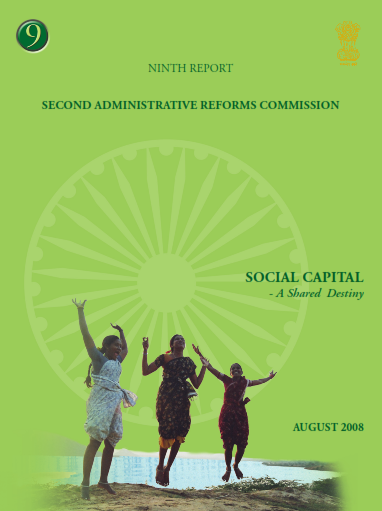(HOT) UPSC Current Affairs 2025 PDF
NEW! The Gist (NOV-2025) | E-BOOKS
(Report) 2nd Administrative Reforms Commission : Social Capital - A Shared Destiny

(Report) 2nd Administrative Reforms Commission :Social Capital - A Shared Destiny
Contents :
Chapter 1 Introduction 1
Chapter 2 Evolution and Growth 7
2.2 Social Action Groups and Self-Help Movement 7
2.3 Corporate Foundations 8
2.4. Socio-Political Movement and Growth of Constitutionalism 8
and Equity
2.5 Cooperatives 9
2.6 Existing Laws 9
2.7 Social Capital Organizations and India’s Constitution 10
2.8 Government Policy 11
2.9 Civil Society as a Major Economic Force 13
2.10 Voluntary Sector – Its Classification 14
2.11 Legal Standing of Social Capital / Civil Society 15
Institutions in other Countries
Chapter 3 Societies, Trusts/Charitable Institutions, 17
Waqfs and Endowments
3.1 Legal and Institutional Framework 17
3.2 Revenues of the Third Sector 43
3.3 Charitable Organisations and Tax Laws 50
3.4 Regulation of Foreign Contribution 56
Chapter 4 Third Sector Organisations at the Local Level – 68
Self-Help Groups
4.1 General 68
4.2 Financial Inclusion – Current Status in the Country 68
4.3 Evolution of the SHG Movement in India 72
4.4 International Experience 86
4.5 Impact on Rural Life 88
4.6 Issues of SHG Movement 91
x xi
Chapter 5 Self-Regulatory Authorities 113
5.1 Introduction 113
5.2 Separating Professional Education from 114
Self-Regulatory Authorities
5.3 Professional Updation 121
5.4 Ethical Education and Training 122
5.5 Enrolment in the Profession 122
5.6 Renewal/Revalidation of Registration 123
5.7 Disciplinary Mechanism 124
5.8 Compostion 127
5.9 Accountability and Parliamentary Oversight 131
Chapter 6 Cooperatives 133
6.1 Introduction 133
6.2 History of Cooperatives in India 133
6.3 Existing Weaknesses 135
6.4 Constitutional Context 138
6.5 Legislative Framework 143
6.6 Producer Companies 148
6.7 Cooperative Credit and Banking Institutions 153

